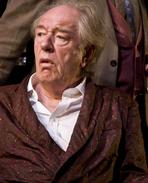SITE GUIDE
SEARCH
REVIEWS
REVIEW ARCHIVES
ADVERTISING AT CURTAINUP
FEATURES
NEWS
Etcetera and
Short Term Listings
LISTINGS
Broadway
Off-Broadway
NYC Restaurants
BOOKS and CDs
OTHER PLACES
Berkshires
London
California
New Jersey
DC
Philadelphia
Elsewhere
QUOTES
TKTS
PLAYWRIGHTS' ALBUMS
LETTERS TO EDITOR
FILM
LINKS
MISCELLANEOUS
Free Updates
Masthead
Writing for Us
A CurtainUp  London Review
London Review
 London Review
London ReviewNo Manís Land
|
You are in no manís land. Which never moves, which never changes, which never grows older, but which remains forever, icy and silent— Hirst
|

Michael Gambon as Hirst
(Photo: Jeremy Whelehan) |
No Manís Land is undeniably classic Pinter, with its non-sequiturs, frustrated ambitions, belligerence, elusive or unexplained power dynamics and very articulate, if utterly random, dialogue. Combined with the playís bleak quality, this production enjoys a generous helping of sheer style with a glossy, refined elegance, which reflects Gooldís ability to create an immersive atmosphere.
The subtle and intelligent sound effects include intermittent gusts of wind, providing a sense of desolation and the icy desert which the characters refer to as "no manís land". Neil Austinís sophisticated lighting adds extra visual ambience to the feeling of barrenness at the core of this text. Meanwhile, the set designed by Giles Cadle adds the veneer of superficial civilisation and society, not to mention alcoholism. A hybrid between 1960s chic and 21st century newness, an extensive cocktail bar dominates the stage and various eastern artefacts are displayed.
Both Gambon and Bradley recently played Davies in The Caretaker to great critical acclaim. To have them playing opposite each other in No Manís Land, which reworks so many of the earlier playís themes and power games, is therefore quite a theatrical occasion. Michael Gambon has proved in the past how expertly he can portray the certain spiritual vacuity which is integral to many Pinter roles. In Hirst, however, the successfully wealthy but now elderly and dependent writer, he combines this with a more mercurial character. He transforms utterly from one scene to the next, from catatonic state to sprightly, loquacious energy, from writhing and crawling on the floor, to downing spirits with the speed and thoroughness of a drinking game for one. Above all, Gambon portrays the forlorn aimlessness of this man who has everything and nothing simultaneously, no future and a crumbled past. It strikes home, therefore, when he says: "Tonight, my friend, you find me on the last lap of a race I have long forgotten to run."
David Bradley is also excellent as Spooner, the proud but scrounging poet desperately clinging to his dignity in the midst of this disturbing yet potentially lucrative household. Moreover, his nasal voice is a perfect antidote to Gambonís deep portentous tones. David Walliams tackles the role of Foster, no mean feat when playing opposite two stalwarts of British theatre, but Gooldís gamble in choosing him pays off and Walliams encapsulates well the ambiguity of this roleís sexuality, charm and menace. Completing the skilful cast is Nick Dunning as Briggs, Fosterís more straightforward and sinister sidekick.
Beneath this slick, accomplished production, there is also quasi-tension at the heart of this venture: Rupert Goold is an incredibly exciting, dynamic director, who can shape classic texts into electrifyingly original recreations. His arctic Tempest and his morbidly gruesome Stalinist Macbeth are just two recent examples of his breathtakingly innovative streak. Here, however, he meets a pedantically precise playwright, whose territorial control over the microscopic niceties of the text, extending to the length of pauses or the placement of commas, is legendary. The question is whether Rupert Gooldís brilliance has enough scope to express itself within this sort of restriction, as well as the larger limitation of Pinteresque nihilistic blankness. Although in many ways a flawless realisation of the play, I canít help feeling that Gooldís inspirational energies would be better exploited elsewhere, particularly with more malleable texts and thematic richness.
|
No Manís Land
Written by Harold Pinter Directed by Rupert Goold With: Michael Gambon, David Bradley, David Walliams, Nick Dunning Design: Giles Cadle Lighting: Neil Austin Music and Sound: Adam Cork Running time: 2 hours 10 minutes with one interval Box Office: 0870 060 6623 Booking to 3rd January 2009 Reviewed by Charlotte Loveridge based on 8th October 2008 performance at The Duke of Yorkís Theatre, St Martinís Lane, London, WC2N 4BG (Tube: Leicester Square) |
|
REVIEW FEEDBACK Highlight one of the responses below and click "copy" or"CTRL+C"
Paste the highlighted text into the subject line (CTRL+ V): Feel free to add detailed comments in the body of the email and state if you'd like your comments published in our letters section. |
|
London Theatre Tickets Lion King Tickets Billy Elliot Tickets Mighty Boosh Tickets Mamma Mia Tickets We Will Rock You Tickets Theatre Tickets |




